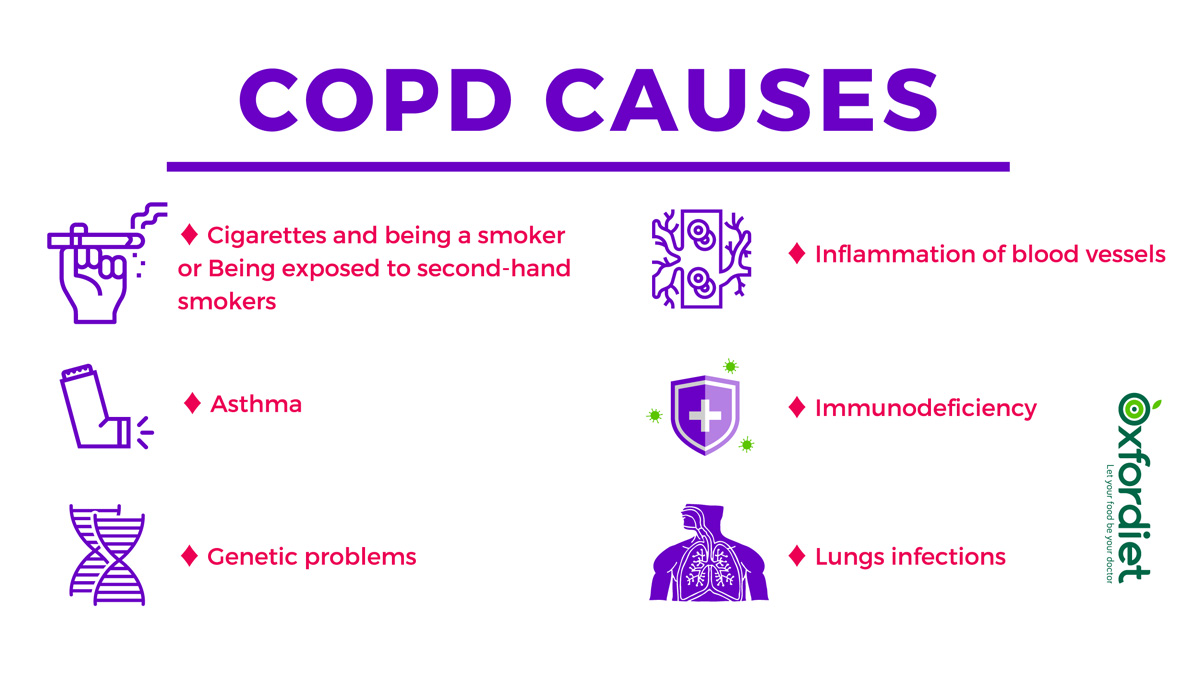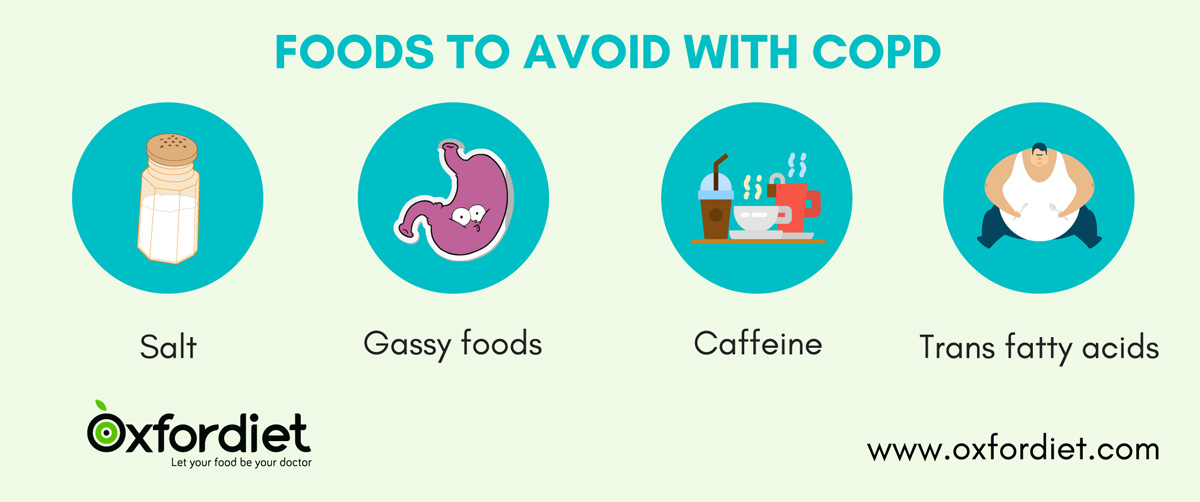Chronic obstructive pulmonary disease is a complex condition with major signs of coughs and shortness of breath. According to the WHO stats, about 65 million people suffer from COPD around the world. Because of being a chronic disease, diet and eating habits and patterns play an important role in treating and controlling the illness. The COPD diet should and should not be consumed to reduce the symptoms of the disease.
Chronic obstructive pulmonary disease is an illness related to the respiratory system. This term is used for a group of conditions named small airways obstruction, emphysema, and chronic bronchitis. The blockage and obstruction in the respiratory system's airways occur during this disease making breathing hard for the patients and causing progressive and irreversible airflow limitation. The inflammation in the wall of damaged sacs, which exchange the air for maintaining the oxygen for cells of all of the body, can have harmful effects on the body's full function. About 90 percent of COPD patients used to smoke.
Some people with COPD find that eating a diet high in fat and low in carbohydrates makes it easier to breathe. Generally, a proper nutrient balance in a COPD diet can help you breathe easier.
There are a lot of reasons that can be risk factors for COPD that the important ones of them are:
♦ Cigarettes and being a smoker
♦ Asthma
♦ Genetic problems
♦ Inflammation of blood vessels
♦ Immunodeficiency
♦ Being exposed to second-hand smokers
♦ Excessive exposure to polluted air or even polluted cities
♦ Infections involving lungs

Mild and moderate stage symptoms of COPD:
♦ Whistle sound during breathing
♦ Chest pain
♦ Persistent cough
♦ Dyspnea
Severe stages of symptoms of COPD:
♦ Losing weight
♦ Gasp
♦ Respiratory failure
♦ Blue lips due to the lack of oxygen
♦ Confusion
♦ Edema
There are many ways to treat and cure COPD, but it can't be cured entirely. Any way below is a list of COPD treatment strategy:
♦ Lifestyle change
♦ Supplementation
♦ Quitting smoking
♦ Breathing exercise
♦ COPD diet
♦ Oxygen therapy
♦ Steroid components in medicine
♦ Bronchodilators, Anti-inflammatory, Antibiotics, drugs
♦ Vaccinations
♦ Medications for control of mucous
♦ Surgery
You should consult a dietitian to help you find the easiest way of getting your diet. In the following, we will explain to you how the diet COPD should to be:
COPD patients may experience malnutrition because of their lower intake of foods. The low quality of their life depends on their disease, so the COPD diet should pay attention to the foods to make up for this condition and focus on the proteins. Malnutrition can worsen the symptoms of COPD, such as respiratory muscle weakness. Disability, a higher risk of getting infected, and hormonal changes.
The main focus of the diet is energy and energy expenditure after fluids. Maintenance of energy balance has an essential role in diet planning. Getting less carbohydrate can lead to loss and protein expenditure as an energy source, so the adequate amount of the proteins should be adequately considered. The respiratory cell of the lungs in COPD use more energy than a normal person.
The metabolism of nutrients is different from each other. Therefore they make different carbon dioxide levels, which is needed to be exchanged through the respiratory system.
Carbohydrates produce the most amount of CO2, and the least level is related to the CO2 product of burnt fats. Modifying the number of adequate nutrients fit to the COPD in COPD diet is the best way of getting along the disease and the lifestyle change required for the COPD.
The carbohydrates intake should be limited and restricted to getting the simple type of carb substituted for complex carbs. The amount of fibre consuming should be around 20-30 grams daily.
The diet should be formed of complex carbohydrates.
Complex carbs: whole grain pasta, bread, starchy vegetables, and fruits.
Restriction in simple carbohydrates: sugar, cakes, sweets
Accumulation of fat in adipose tissue of visceral and abdominal fat can lead to more systematic inflammatory status and worsen COPD's condition.
People with COPD may use steroids for therapy, but this should be under control and by the doctor's concern. Long term using steroids may lead to Calcium deficiency. Calcium supplementation, especially the components and supplements which include vitamin D, can be beneficial.
The COPD diet should be high in fat, so we get between 30 and 45% of patients' energy from fats. It is better to use omega-3 fat sources such as olives and nuts and liquid vegetable fats in the diet.
The major factors that affect COPD, lung functions, and dietary behaviour are age, gender, age, BMI, physical activity, nutrient intake, energy balance, smoking, and cigarette smoke exposure.
For example, women are at higher risk of getting induced by lung impairment than men. Smokers are experiencing high levels of oxidative stress than non-smokers or ex-smokers. Low serum antioxidant vitamin levels can exacerbate the inflammation and the disease. Studies have shown that COPD patients are more likely to have less intake of fruits and vegetables. Therefore, they have poorer antioxidants serum levels. They have less energy intake and an unbalanced diet. Diets and regimens containing antioxidants can be effective and retrieve the weaknesses of COPD.
Larger amounts of citrus fruits, whole grains, and seeds are recommended to ensure the adequate intake of various antioxidants such as vitamins C and E. People who smoke need more vitamin C in their diet.
Due to COPD patients' condition, if the patient is suffering from edema, the nutritionist or dietitian can concern about the sodium of the body and the sodium intake from foods through diet. Excessive sodium intake can lead to water retention, which interferes with the breathing process. Substitution of salt or sodium by herbs and seasoning can lead to a better and more tasty diet and meals.
Staying hydrated is very important for people with COPD because adequate water maintains the respiratory tissues more flexible and helps mucous production. Dehydration causes thickening of the secretory mucus and worsens the patient's condition. If the patient has a fever, he needs to pay special attention to the number of fluids he receives. The COPD patients should drink about eight glasses of water through foods and drinks to stay hydrated, but it should be divided into all-day hours. The general rule for fluid intake in a person's daily diet is 1 ml per calorie intake.
10-30 percent of COPD patients have iron deficiency and suffer from anemia. Therefore, rich sources of iron should be used, like meats or fortified foods.
You should avoid coffee and caffeine because there is a lot of interference between the drugs used for COPD and caffeine. Limiting coffee, tea, chocolate should be considered in the COPD diet.
Usual and continuous light activity can help the respiratory system's muscles strengthen and retrieve their weaknesses through COPD disease. Physical activity and exercises are helpful during treatment. Still, they can also be done during a lifetime to prevent the occurrence of COPD.
If you have COPD, you should avoid some food in your COPD diet, include:
♦ Salt
♦ Gassy foods and those foods containing fermentable carbohydrates
♦ Caffeine
♦ Trans fatty acids and foods including oxidative components
